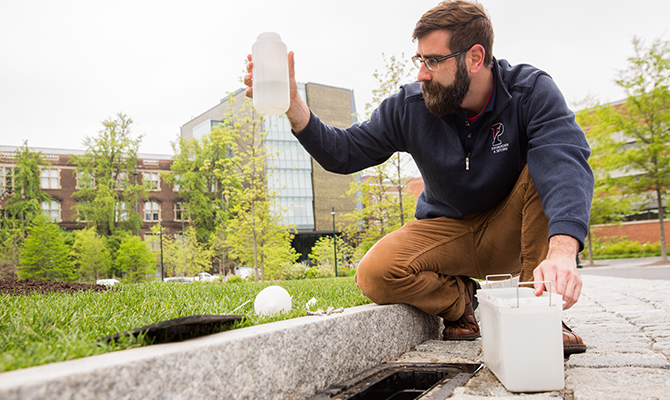
Tailor your curriculum to your goals
The Master of Environmental Studies program provides you with the knowledge base you need to understand complex environmental issues—and allows you the flexibility to develop unique expertise and professional experience in the field of your choice. Penn’s degree is exceptional among environmental studies programs for the breadth of options it offers. With the help of a dedicated academic advisor, you create a curriculum suited precisely to your goals.
At the beginning of your studies, you will be assigned an academic advisor to help you through the course selection process. Together, you’ll determine which skills you hope to develop and which academic and internship experiences match your goals. Not only will you sample a broad range of courses in your first year to aid you in narrowing your focus, but we also provide resources—such as professional development retreats, alumni talks and more—to help you find the path that’s best for you.
As a Master of Environmental Studies student, you will complete 12 course units (c.u.)* that reflect a balance between disciplinary focus and interdisciplinary knowledge. Your course of study includes the following elements (you can read about each curricular element in further depth below):
- The Proseminar: Contemporary Issues in Environmental Studies (1 c.u)
- Data analytics course (1 c.u.)
- Foundation courses (4 c.u.)
- Professional concentration courses (5 c.u.)
- Capstone Seminar (1 c.u.)
The Proseminar: Contemporary Issues in Environmental Studies (1 c.u.)
This course reviews the key sciences fundamental to an interdisciplinary study of the environment: biology, geology, chemistry and physics. It takes a systems approach to the environment with a look at the atmosphere, lithosphere, hydrosphere and biosphere and the intersection of humans with each. This required course also acquaints students with issues, debates and current opinions in the study of the environment. Different styles of writing, from white papers to blogs, will be assigned throughout the semester.
Data Analytics course (1 c.u.)
Effective data analysis and the ability to make data-driven decisions are integral to professional careers in the environmental sector. The data analytics course provides students with an opportunity to gain expertise in an area of data analytics relevant to their professional goals. The requirement can be fulfilled by taking one of the data analytics courses offered in the MES program or an approved data analytics course from other programs.
Foundation courses (4 c.u.)
At both the local and international scale, issues such as climate change, diminishing natural resources, water access, energy security, low-level toxins and habitat destruction all require not only the best science available, but the ability to integrate this knowledge to make decisions even when considerable uncertainties exist.
Environmental challenges are complex, and their solutions never come from just one sector of society. We believe that in order to become a leading problem-solver in the environmental arena, you need to be able to draw connections between many disciplines.
Foundation courses help broaden students’ knowledge in areas of environmental studies outside of their chosen concentration, and complement their chosen field. For example, if they are studying sustainability, their foundation course credits are an opportunity to learn about environmental law and policy, or build understanding of climate adaptation approaches, which will be necessary while working in the sustainability sector. Foundation courses allow students to make connections between different sectors and offer the opportunity to discover unexpected synergies and resonances in fields beyond their own. Foundation courses must be ENVS or EESC courses.
Professional concentration courses (5 c.u.)
While foundation courses give you a broad understanding of environmental issues, your professional concentration courses let you develop the expertise you need to pursue a career in your chosen field.
Concentration courses may be taken in any of the 12 graduate Schools at the University (School of Engineering and Applied Science, Graduate School of Education, Stuart Weitzman School of Design, School of Social Policy & Practice, The Wharton School of Business, Penn Law, etc.). Your advisor will help you select courses that best fit your goals and skills gaps.
You may choose from the following concentrations:
- Environmental Biology
- Environmental Policy
- Environmental Resilience and Adaptation
- Environmental Sustainability
- Resource Management
- Urban Environment
If your professional aspirations are not reflected in one of the above concentrations, you can develop an Individualized concentration in conjunction with your faculty advisor and with the approval of the Faculty Advisory Committee.
Capstone Seminar (1 c.u.)
The capstone project is a distinguishing feature of the Master of Environmental Studies program, blending academic and professional experiences and serving as the culmination of your work in the program. You will design a project drawing from your learning in and outside the classroom to demonstrate mastery of your concentration area.
Unlike a traditional research master’s program, Penn’s Master of Environmental Studies does not expect you to have a research topic and advisor before you begin the program. MES students meet the faculty and learn about project topic ideas when they start the program; in the second semester, the Capstone Seminar helps students identify a topic, develop a research methodology, identify a research committee and write a proposal. Capstone projects are typically applied rather than theoretical. Our students frequently find their first jobs after graduation as a result of the connections they make during the capstone research process.
The capstone projects themselves vary widely, from research papers to videos, business plans, photojournals and websites. However, all projects demonstrate students’ ability to:
- Define a research question
- Design a protocol to address this question
- Acquire the data necessary to clarify, if not resolve, the question
- Critically assess the quality of the data acquired
- Draw defensible conclusions from those data
- Communicate this process and conclusions to professional colleagues with clarity and precision
Time frame
Master of Environmental Studies students may enroll on either a part-time or full-time basis. Your time to graduation will vary depending on how many classes you take each semester and whether you take summer classes. Full-time students can complete the program in two years, taking three or four classes per semester. Part-time students typically complete their work in three years, taking one or two classes per semester. Individuals working full time are advised to take no more than two courses per term.
Transferring graduate credits
Incoming students may petition to transfer up to two graduate-level credits from classes completed at another university prior to their admission at Penn as long as those credits were not used towards another degree. Students seeking transfer credit should fill out a form after they matriculate into the program, along with an official transcript, to the Program Director before the end of their first semester at Penn. A transfer credit form is available on the program’s Online Community, which is accessible to current students only. Transfer credit is evaluated on a case-by-case basis by the faculty advisory committee.
International student internship and post-graduation work opportunities
International Students in the MES program are eligible to work off-campus in internships after their first year in the program in addition to immediate on-campus research opportunities. Visit the Curricular Practical Training page on the International Student and Scholar Services (ISSS) website to get more information on employment options for international students.
MES graduates are eligible for STEM Optional Practical Training (OPT), which is currently an additional 24 months after completing the standard 12 months of employment.





